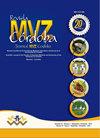危地马拉Sierra de los Cuchumatanes感染肝片吸虫的小柱假琥珀报告
IF 0.3
4区 农林科学
Q4 AGRICULTURE, DAIRY & ANIMAL SCIENCE
引用次数: 1
摘要
客观的确定淡水蜗牛的自然感染是危地马拉肝片吸虫的中间宿主。材料和方法。淡水蜗牛是在Huehuetenango省的一个高海拔村庄(3.000 mamsl)采集的,那里是当地的地方病。蜗牛种类的鉴定是基于使用鉴定钥匙在立体镜下观察到的形态特征。通过使用光源的视觉检查从外部搜索吸虫相,并通过在立体镜和显微镜下解剖和视觉检查组织从内部搜索吸虫相。后果共发现260只蜗牛,鉴定为小柱假琥珀螺。其中两个被发现自然感染了肝吸虫幼虫期。结论。这是危地马拉高地首次报道小柱藻携带肝吸虫阶段。有必要在危地马拉和中美洲其他研究不足的地区加强对这种寄生虫生态学的研究,因为草食性动物和人类的潜在感染风险。本文章由计算机程序翻译,如有差异,请以英文原文为准。
Report of Pseudosuccinea columella, infected with Fasciola hepatica at Sierra de los Cuchumatanes, Guatemala
Objective. Identify the natural infection of freshwater snails as an intermediate host of Fasciola hepatica in Guatemala. Materials and methods. Freshwater snails were collected in a high-altitude village (3.000 mamsl) from Huehuetenango department, where fasciolasis is endemic. The identification of the snail species was based on the morphological characteristics observed under the stereoscope using an identification key. The trematode phases were searched externally by visual inspection using a light source, and internally by dissection and visual inspection of the tissues under a stereoscope and microscope. Results. 260 snails were found and identified as Pseudosuccinea columella. Two of them were found naturally infected with larval phases of F. hepatica. Conclusions. This is the first report of P. columella carrying phases of F. hepatica in the highlands of Guatemala. It is necessary to increase the research of the ecology of this parasite in other understudied areas in Guatemala and Central America, due to the latent risk of infection for populations of herbivorous animals and humans.
求助全文
通过发布文献求助,成功后即可免费获取论文全文。
去求助
来源期刊

Revista Mvz Cordoba
农林科学-奶制品与动物科学
CiteScore
0.70
自引率
0.00%
发文量
41
审稿时长
6-12 weeks
期刊介绍:
The Journal MVZ Córdoba is an open access international scientific journal financed and edited by the University of Córdoba (Colombia). The journal publishes quarterly, continuously in PDF, XML, Epub, original articles, literature reviews, brief communications and clinical cases, peer-reviewed (double-blind) in Spanish and English, which are related to the agricultural and veterinary sciences. The journal is directed to natural and legal persons of veterinary medicine, animal husbandry, public health, epidemiology, aquaculture, biology, basic biomedical sciences and biotechnology and constitutes a space for academic and scientific discussion around the work of professionals in Veterinary Medicine and Zootechnics. Four-monthly publication.
"The Journal MVZ Córdoba supports the policies for registration of clinical trials of the World Health Organization (WHO) and the International Committee of Medical Journal Editors (ICMJE), since it recognizes the importance of these initiatives for international registration and dissemination. of information about clinical studies, in open access. As a result, since 2007, the journal MVZ Córdoba only publishes clinical research articles that have received an identification number in one of the Clinical Trial Registries validated by the criteria established by WHO and ICMJE, whose addresses are available in the ICMJE website. The identification number is recorded at the end of the summary. "
 求助内容:
求助内容: 应助结果提醒方式:
应助结果提醒方式:


